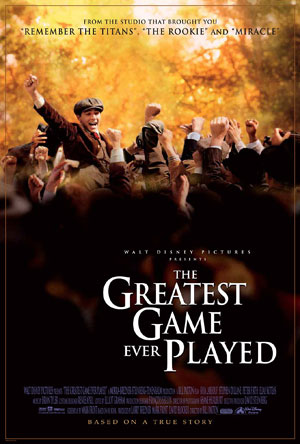 Shia LaBeouf is obsessed with cred, which is weird coming from a guy who got his start on Even Stevens. Or maybe it’s not – LaBeouf comes across as an angry young man (count how many actors he slags in this interview! DeNiro, for one!), which is actually kind of cool.
Shia LaBeouf is obsessed with cred, which is weird coming from a guy who got his start on Even Stevens. Or maybe it’s not – LaBeouf comes across as an angry young man (count how many actors he slags in this interview! DeNiro, for one!), which is actually kind of cool.
In his new film, The Greatest Game Ever Played, Shia is far from an angry young man. He’s certainly determined, though. The film is the true story of Francis Ouimet, a caddy who brok the class barrier that kept the poor out of golf and played in the US Open against his hero, Harry Vardon, considered the greatest golfer alive at the time.
Greatest Game, directed by Bill Paxton, opens this weekend.
Q: The other day I spoke to Jodie Foster and she said that there are some people who just have the personality where they can be child actors and not flame out and become adult actors. What do you think that personality is? You seem to have it, since you haven’t flamed out yet.
LaBeouf: I haven’t sold out yet either and I think that’s a big reason people flame out, having cashed in. I don’t know what it is. If I could bottle it up I would probably sell it. I don’t know what it quite is. I know what it isn’t: it isn’t making films you know are bad. It isn’t making a movie with a plotline that’s garbage just so you can get a four million dollar paycheck and live really nice. If you’re making art, make art. If you’re going to be an actor, be an actor. If you’re going to make an album, make an album. If you’re going to do everything at once, you’re going to be terrible at all of them. I stick to my guns. I’m trying to make art. I’m not trying to cash in. I always say, if I cashed in I would probably have a really nice bed but I wouldn’t be able to sleep in it, because I wouldn’t respect myself and I would hate myself. It would be terrible, I would be depressed. It would cost me more money with psychiatrists than if I never went in.
It’s also picking and choosing and knowing that when you have something you think is promising, and something you don’t think you want to throw away, you keep it. You hold off. I didn’t work all of last year, I waited all year and went and did a 2 million dollar film. Which is strange for me for some people, because I’m always doing studio films.
Certain steps you take to get to certain places. All of these steps – Constantine, I Robot – stuff like that that were these money films, slightly sell out kinds of things, brought me here. I wouldn’t be able to helm this film if I didn’t do that type of stuff. Nobody gets to just jump in and helm a film like that. You got to pay dues. So mostly everything after Holes has been kind of paying dues, and brought me here so now I’m able to do this.
And the film I just finished in New York is a completely different route.
Q: What’s that?
LaBeouf: A movie with Robert Downey Jr, Rosario Dawson, Chas Palminteri, Dianne Wiest, Eric Roberts – insane cast – called A Guide to Recognizing Your Saints. I don’t know if any of you guys have seen Style Wars, a documentary. It’s like Kids, it’s about a group of kids who grow up in Astoria, Queens in the 1980s and Ditto is the only one to get out of the neighborhood. He recognizes his friends as saints, they all perish or pass away or fall into crack. Far from this Greatest Game thing. I’m trying to mix it up. But it’s hard when you get labeled as certain things.
Q: Do you have a grand plan for your career?
LaBeouf: After Dustin Hoffman became famous with The Graduate he flipped it and then played like a 90 year old woman in a movie. I’m just trying to flip things as much as possible, but in today’s film world you have independents that aren’t quite independents. You have big huge production companies making small movies with big actors. It’s hard to navigate this puzzle right now. It’s a tough business, this film business.
Now you’ve got this 2929 situation where they’re going to change distribution completely, where they’re going to release the film and the DVD and put it on cable all at once. That changes filmmaking completely. There’s going to be less money made by these studios, which means less movies are going to be made by these studios, which means there’s less opportunity to make great film. It’s all changing, man. I’m just trying to catch it right now, but I’m not going to make Cody Banks 5 or any garbage like that. It’s not what I’m trying to do.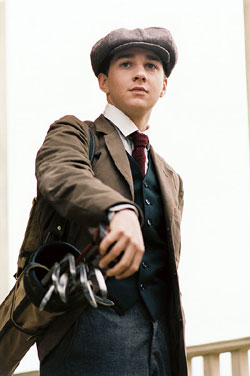 Q: How do you go about choosing your projects?
Q: How do you go about choosing your projects?
LaBeouf: I read it and sometimes I go, ‘That’s not me, I can’t do that!’ So I have to go do it. It’s challenging yourself, it’s getting to a place you don’t feel comfortable. The minute you feel comfortable on a set, you’re working on a piece of crap. You know it right away. You can feel it. The minute you’re not struggling to get through the film, you’re not doing anything. There’s no work being done. They call it phoning it in. That’s fine, lots of actors do that. There’s nothing wrong with it. Robert DeNiro – amazing actor. What’s going on with the last couple films, you know? That’s what happens. But he’s still Robert DeNiro; Raging Bull is still the best performance put on film. But everybody does it. It just goes to show you that it happens to everyone. The goal is to never do it, but that goal is rarely reached. Daniel Day Lewis does it, but does he live a happy life? I don’t know. It depends on what you want. I’m OK with being happy and doing things I love.
Q: What you’ve said sounds like you could be speaking for your character as well as yourself. Can you speak about your character?
LaBeouf: Francis, that was the whole appeal of the movie. Golf was secondary. It could have been Frisbee. Francis was an amazing human being. You look back at 1913, there was a surplus of immigrants coming into the country, and they had no hero. So there’s this void and Francis happened to have a dream that was directed right at that void – without him knowing it. He didn’t know he was going to become this hero.
As far as the class struggle went, he wasn’t even allowed to have that dream. You weren’t even allowed to think that way. It was insane for him to think he could do that. Before him you had people like Ty Cobb, sports heroes, but even they weren’t treated like Michael Jordan is now, or like LeBron James is treated now. They were treated like, I always say, somewhat janitorial. It wasn’t this occupation. It wasn’t ‘TY COBB!’ That never happened. People nowadays look back and go, ‘Wow, TY COBB!’ Ty Cobb wasn’t getting ‘TY COBB!’ when he was Ty Cobb. If you can understand what that means, because I don’t!
What I mean to say is that there was no such thing as a professional athlete in this heroic type of sense – there was an occupation. Francis changed that, because there was emotion behind it, the country was emotional about his win. He was a face you could put on a class of people. He created a middle class in America. It’s way beyond golf. There was no such thing as a public course when Francis was playing. After Francis won they started making municipal public courses, and it became a public sport. Before that it was a rich man’s hobby in America. Soccer still has yet to break through to America because there was no Francis for soccer. Who is it? David Beckham? He’s married to a Spice Girl. That’s not Francis. Francis was a man. Francis was honorable. Francis was a family man, he had integrity. Francis was respectful. He was shy. He wasn’t the poster boy for any kind of sport that you would think of.
Q: He did it for the love of the sport, clearly. Which is different from many athletes today who strive for the endorsement deals.
LaBeouf: Absolutely. He never went pro. Never. He was never trying to cash in. The truth was that it wasn’t for the game, really. As an actor I was never getting any attention or affection or love from my father, and I was getting affection and love from Harry Vardon’s words, which were leading me to golf. Once I got to golf I was getting affection from Eddie. It was three different loves I was getting.
If the film would have kept continuing past that scene, Francis became reclusive. That wouldn’t have been the kind of film we were trying to make. We were trying to make the kind of film Americans want to watch right now. Who wants to watch depressing shit right now, when we got this going on. Nobody wants to see that. We’re trying to make a film that’s pleasant for an hour and a half, that will make people feel good.
At the same time, this isn’t the regular Disney type of sports film. You go watch Miracle orRemember the Titans – great films, yes, but Dick Cook says ours is the best sports film is
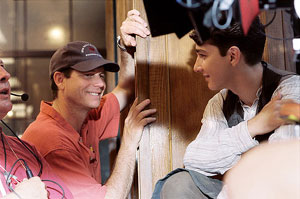 studio has ever made. Bill Clinton said it’s his favorite movie ever. George Bush Sr hand wrote a note to the head of publicity at Disney saying it was his favorite film and he would love to help. Larry King said it was better than Seabiscuit. Nobody left Seabiscuit saying ‘What a great horse film.’ Nobody is walking out of this movie at all the screenings we have done and said, ‘Wow, what a great golf film.’ That has not happened yet.
studio has ever made. Bill Clinton said it’s his favorite movie ever. George Bush Sr hand wrote a note to the head of publicity at Disney saying it was his favorite film and he would love to help. Larry King said it was better than Seabiscuit. Nobody left Seabiscuit saying ‘What a great horse film.’ Nobody is walking out of this movie at all the screenings we have done and said, ‘Wow, what a great golf film.’ That has not happened yet.
And the reality of it is that in sports films usually this is how the story breaks down: you have the hero, and he’s not doing well in school, or he’s the bad guy or whatever it is. He’s the underdog. His dream is to win. Then you have an opposition, who is vilified to make the stakes high. In this movie there is no such thing as a villain. Harry Vardon is not vilified. He is the opposition, but he is loved, because his story is very similar to Francis’.
So it’s not the regular type of sports film. It’s not the regular type of film. The stakes are created purely out of people’s personal characters; it’s not created out of this Lego, pieced together type of Disney sports film. That’s not what this is. It’s a character based film. Has anybody ever seen Equus – Peter Firth? He’s insane, he’s a great actor. Stephen Dillane – these people aren’t famous. When do you get a budget like this on a film and then get no star actors in a movie? That’s Bill Paxton pushing for it.
Q: Bill Paxton has been a working actor for years. What’s it like having a director who really knows what the acting game is all about?
LaBeouf: Bill Paxton, regardless of what people think of his acting, he’s been in some of the biggest films of all time, worked with some of the best directors of all time. When he gets on set, it’s like he’s a mosaic of all these different things he’s learned.
The biggest thing I have with Bill is trust. It’s a hard thing to have trust with a director. My medium is an exposed, vulnerable medium. I need somebody on the other side I can trust, somebody I can bounce thoughts off of, somebody I can bounce emotions off of and know that they’re receiving them and giving them back. Often you have directors that just sit behind the monitor. Bill doesn’t do it like that. He’s an actor and he knows what feels good as an actor, so he creates an environment that would feel good to him. It’s an enjoyable experience.
Plus we found the character together. We did the research together, we did the training together. We did everything together.
Q: What was the most challenging thing about this role? What was the thing that you looked at and thought you couldn’t do it?
LaBeouf: I don’t know if you’ve ever seen golf on television, but whether you like the game or not, it’s the people who are intriguing. You sit there and you watch these guys who have these little six inch putts to make, and if they make the putt, their life is changing for the better, everything is great. And they end up missing the putts. They don’t scream, they don’t pull a Jeremy Shockey and go crazy and punch a wall. They take their hat off, they smile at the audience and wave, they put their hat back on. That’s a cowboy, that’s not a golfer. In their mind you know they’re crying and they’re screaming and they’re losing it, but they won’t show it. That’s a cowboy. Bill Paxton said we’re making a cowboy film, not a golf film. This isn’t Bagger Vance, it’s Tombstone. That’s’ what we showed up to make.
We showed up to make the quintessential golf film, because up to this point the quintessential golf film had not been made. What is it, Happy Gilmore? Caddyshack? These are all satires of golf. There’s never been a golf film made. Bagger Vance was them filming golf. We were filming the mind of a golfer. Golfers, especially with Bagger Vance – I was on 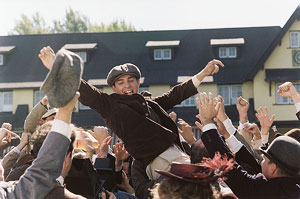 tour with the UCLA golf team for a while and asked them what their favorite golf movie was and if they liked Bagger Vance, and they said, ‘No, we hated Bagger Vance.’ I asked why and they said, ‘Because he wasn’t a golfer. You can tell right away by the swing.’ This wasn’t Bernie Mac playing baseball – you can fake that. You can’t fake a swing. He trained for two weeks to get that swing in Bagger Vance. Jim Caviezel in Bobby Jones trained for three weeks. I trained for six months. Nuts training. The UCLA golf team I was rolling around with for a while, at their collegiate competitions. I learned there was trash talk and such a thing as golf groupies. It’s a whole different world!
tour with the UCLA golf team for a while and asked them what their favorite golf movie was and if they liked Bagger Vance, and they said, ‘No, we hated Bagger Vance.’ I asked why and they said, ‘Because he wasn’t a golfer. You can tell right away by the swing.’ This wasn’t Bernie Mac playing baseball – you can fake that. You can’t fake a swing. He trained for two weeks to get that swing in Bagger Vance. Jim Caviezel in Bobby Jones trained for three weeks. I trained for six months. Nuts training. The UCLA golf team I was rolling around with for a while, at their collegiate competitions. I learned there was trash talk and such a thing as golf groupies. It’s a whole different world!
And then I went to the US Open and shadowed Adam Scott at Shinnecock last year. He was doing seven hours a day, seven days a week kind of training. I did virtual training, where we would put Francis’ swing on this virtual goggle. They would have a camera and I would try to match the swing. I would do that for hours in my hotel room. We would do calisthenics and yoga training and back exercises. This was nuts. This wasn’t like, pick up a club and be an actor today. Bill didn’t go like that. He handed me the club like this is a weapon. I felt like I was holding a gun, something I could do some damage with.
I didn’t show up on set like, ‘I’m a duffer, let’s go do that.’ I would have hated the movie if I did. This was war. When you got a hundred thousand people on a course and you’ve got a putt to make that’s this long and your hero is standing right there and your father is right there and you’ve got a ten year old caddy right here and you’ve never been in front of this many people – you can’t put a hundred thousand people in the Staples Center. This is 1913; these people came from all over America to be there. He’s doing a putt, shaking. That’s insane. That build up is nuts.
My father hasn’t seen the movie yet but one of the joys of making this film has been taking these grown men who you’ve never seen cry and making them cry. My dad is going to bawl like a little girl. It’s very close to my family in a strange way, with the golf and the acting and the proving yourself to your family.
Q: How is your golf game?
LaBeouf: Good enough to look good. 95% of the shots in the movie are me. I think there was one shot where it was a stunt double, where it was that hop over the other ball. All the swings are me. If you’re asking my handicap, I’d say spelling. I don’t have a handicap; I’m not that into it. It’s a role. But I’m getting into golf now, the mentality of it. These people are like golf crack heads, they can’t get enough and it’s never good and they’re never satisfied. It’s like, come on man, if you’re a 12 handicap, go to sleep. These guys never sleep! ‘I gotta be a 4 man, I gotta be a negative 2!’ Golf turns people into trolls man, it’s insane. I wouldn’t want to be attached like that. But I enjoy the sport.
Q: When you’re on a film like this with a young actor like Josh [Flitter, playing 10 year old caddy Eddie] do you feel a sense of responsibility, having been a young actor in the industry for so long?
LaBeouf: Absolutely. When I came up, John Voight was mine. I am no where near that to Josh. But I remember when I was doing Holes and John Voight mentored me and took me under his arm and it’s still the same way now. I can call him and be like, this interview didn’t go very well, this interview did go well. He’s always there; he’s always on the other end of the phone.
You create these kinds of people in your life – Keanu Reeves, Bill Paxton. These are humongous people who aren’t just famous human beings. Although once and a while you go, ‘You’re Bill Paxton! You are Bill Paxton!’ That’ll never change for me, but the truth is that they really help. They went through it. Bill had a moment where Bill was making the transition from teenage to adult. Keanu did it definitely. John Voight never did it, but John Voight went a different route. These guys add major things to my life, major influence. So I’m trying to give that to Josh the best I can. I still haven’t experienced enough but the guidance I’ve gotten I’ve given to him. But he’s ten – he doesn’t want to talk about anything but The Jets and girls. And I don’t think he even wants to talk about girls yet either, so it’s just Jets. What a boring convo!
Q: Being able to immerse yourself in golf, that has to be one of the perks of taking a job like this. Is there another sport or activity you wish you could do that for?
LaBeouf: There are perks to this business, it’s not like I’m turning into some golfer. It’s cool to do that, absolutely. It’s not like I’m learning to speak French, I don’t think I’m going to be doing that on some film or anything. I surf. That’s cool. I would like to do something with surfing, but it has to be the right role. That’s another kind of selling out. I want to take a vacation, so I’ll shoot this piece of crap in Tahiti. I can’t do that. My father would go crazy.
I come from a family of artists, I don’t come from a family of rich people who need money. My dad is cool living in a teepee. My family is not that way. They just want me to do good art. That’s all they want.
Q: What do you think the public perception of you is, and do you think it’s correct?
LaBeouf: It’s never correct. It’s never accurate. You guys are meeting a representative. This isn’t Shia, this is the guy I’m presenting to you.
Q: What is Shia like? Can the rep tell us?
LaBeouf: So not Disney, I guess. I’m not Disney. Sometimes it does come out, but I’m not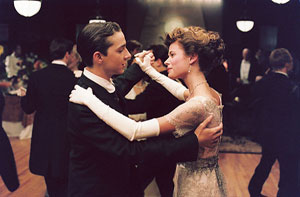 Disney. And I think Disney kind of like that; they’re trying to reinvent themselves as well. They realize that old Disney doesn’t work. Ice Princess? Come on, get out of here. You’re going to make Ice Princess and try to market that to a bunch of 13 year olds who all play Grand Theft Auto? They don’t want to see Ice Princess. They want to see Pulp Fiction. Kids are growing up so fast now.
Disney. And I think Disney kind of like that; they’re trying to reinvent themselves as well. They realize that old Disney doesn’t work. Ice Princess? Come on, get out of here. You’re going to make Ice Princess and try to market that to a bunch of 13 year olds who all play Grand Theft Auto? They don’t want to see Ice Princess. They want to see Pulp Fiction. Kids are growing up so fast now.
I don’t know what my public perception would be. I guess I’m like the funny guy.
Q: Do you think this movie is going to connect with kids who play Grand Theft Auto?
LaBeouf: I don’t think we made this movie for any kind of demographic. I know the company starts doing that kind of thing. They screened the film 200 times and they’ve been doing points tests, and the lowest we’ve got was a 93, and that was from ten to thirteen ratio. The movie screens well.
If the movie could just speak for itself, we’d be on fire. The truth is that America is not going to – they don’t always support quality or good film. They’re going to see Into the Blue. That’s the truth of the matter. Into the Blue is going to murder us. It’s going to win the weekend. That’s the situation. Look back at what’s making money and what people are supporting. Artists are like drowning. But the truth is that there are some people who want to see art, but it’s not the bulk of the community. So even if they do win their weekend, I’m guessing people will wise up at some point. We’re going to be out for a long time – it’s going to be the same kind of grass roots thing Holes had, where we came in third first weekend and we wound up grossing 68 million dollars. That’s because people were discovering the film. This will be a slow roll, and everybody is OK with that.
It’s not about making money. We know we made a good film.
Q: Why do you think people don’t support art? Why do you think Into the Blue might kick your ass?
LaBeouf: Because I don’t look like Jessica Alba.
Q: That’s true.
LaBeouf: And I don’t look like Paul Walker. People know these are not the best actors in the bunch, but it’s not about that, I guess. Some people want to see that, that’s respectable. I mean I respect that. You can’t hate on that. I respect it. But it’s not what I’m trying to do and I don’t know if that would be my audience necessarily, or this movie’s audience necessarily. It’s not like they’re stealing our audience, it’s that we don’t know if our audience is going to show up. They might just look at the movie and go, ‘Aw, it’s a golf movie.’ The reality is that people like you guys would help us get an audience and help this film reach a different kind of situation.
Seabiscuit had Chris Cooper and the star cast behind it and this story people knew about. We have a story not many people know about, we have a cast that not many people know about and a sport that – a lot of people don’t like the sport. But the movie is insane. The movie is really good. And it’s hard to do that. The publicity team at Disney – it’s a handful of problems to deal with this.
All I know is that we made a good movie and we worked our off, and people have a tendency to enjoy the film.